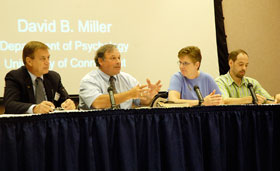  |
| HOME | THIS ISSUE | CALENDAR | GRANTS | BACK ISSUES | < BACK | NEXT > |
Conference examines transition from high school to collegeBy Richard Veilleux - August 29, 2005 |
||||
|
Since 2002, David Miller has volunteered to deliver a college edition of “Scared Straight” to each and every freshman who attends an orientation session in Storrs, interspersing humor with his PowerPoint presentation of what the 17- and 18-year-olds will face when they arrive at UConn. “I know the problems and challenges these kids face. I see them every day when I’m teaching freshman psychology to 300 students,” says the longtime professor of psychology, estimating he has taught more than 20,000 freshmen since arriving at UConn. In mid-July, Miller delivered an encore performance of what he calls Miller’s Boot Camp to nearly 50 teachers from across the state, as well as dozens of UConn faculty and staff who teach First Year Experience courses to freshmen, during the fifth annual First Year Experience Conference at UConn, sponsored by FYE and the Early College Experience. It was vintage Miller as he performed the identical routine he presents to incoming freshmen, when he warns them that the hand-holding, pre-test reviews, and social promotions they may have enjoyed in high school have come to an end. Rather than getting excellent grades while studying for five or fewer hours per week, he tells them, they must devote at least 45 hours to the books if they hope to survive at UConn. High school teachers participating in the conference said it is a challenge to prepare a wide variety of students at the same time – not only those who will attend UConn but others who will attend different types of higher education institutions and some who will not go to college. “We’re trying to educate all students,” said John Bedlack, director of guidance at Windsor High School, who spoke on a panel of high school teachers and administrators that followed Miller to the stage. “We’re the only country in the world to do that, and we’re trying to do that and prepare them for college.” Bedlack added that high school teachers and administrators also have to deal with parents who see promotion as an entitlement: “They say, ‘I pay taxes. My child will graduate.’ “We do have rules, expectations,” he said. “We demand punctuality, try to motivate students. We (high schools and colleges) have to work together. The students have to know there are consequences for poor preparation.” The University has developed a number of programs to assist students with the transition.
Besides a full two-day orientation and FYE classes, there are dozens of tutors available in the Center for Undergraduate Education, and Early College Experience, formerly the High School Cooperative Program. Freshmen who are in danger of failing a class even before mid-term exams are contacted, warned, and referred to an academic advisor. The programs work – nearly 90 percent of UConn’s freshmen return for their sophomore year, one of the highest percentages in the nation. During a series of afternoon breakout sessions, the teachers and UConn representatives exchanged ideas on additional ways to smooth the transition. Planners of the day-long event hoped the high school teachers and FYE instructors would learn from each other. “It’s a great way to exchange ideas,” said Steven Jarvi, assistant vice provost. “The high school teachers learn a little more about how they can help their students better prepare for UConn, and the FYE instructors have a chance to talk to teachers about what they can expect from, and what they’ll have to teach, the next class of students.” One way they may help the new students is by explaining, as Miller says, the game is a lot faster once you hit college. High school teachers say they often have to go over reading material and homework because so many students don’t do the work. “I go over the reading material the next day, primarily because of the underachieving kids in the classroom,” says John Duffy, a mathematics teacher at Torrington High School. “We have diverse classrooms, with a range of abilities.” David Ouimette, director of First Year Programs, one of the conference organizers, is a former high school teacher. “Having been a high school teacher and then working at UConn, it became clear to me that the idea of the ‘evolving student’ is a subject that needs to be addressed. We need to pay more attention to this issue and continue to work together for student success.” |
| ADVANCE HOME UCONN HOME |

